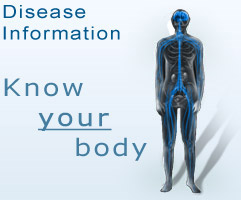Hyperthyroidism
What is hyperthyroidism?
Hyperthyroidism is a condition in which your thyroid gland produces too much of the hormone thyroxine, also known as an overactive thyroid gland.
The thyroid gland is an important organ of the endocrine system. It is located in the front of the neck just below the voice box. The gland produces the hormones thyroxine (T4) and triiodothyronine (T3), which controls the way every cell in the body uses energy. This process is called metabolism.
Causes of hyperthyroidism
Many conditions can cause this problem, including:
- getting too much iodine
- Graves' disease (autoimmune disorder in which antibodies produced by your immune system stimulates your thyroid to produce too much T4)
- thyroiditis (inflammation of the thyroid) due to viral infections or other causes
- non-cancerous growths of the thyroid gland or pituitary gland
- some tumours of the testes or ovaries
- taking large amounts of thyroid hormone.
Who is at risk?
You have an increased risk of developing hyperthyroidism if there is a family history of thyroid disease.
Signs and symptoms of hyperthyroidism
Most people with hyperthyroidism have symptoms, including one or more of the following:
- Anxiety, irritability, trouble sleeping
- Weakness (in particular of the upper arms and thighs, making it difficult to lift heavy items or climb stairs or get up from a chair)
- Tremors (of the hands)
- Perspiring more than normal, difficulty tolerating hot weather
- Rapid, forceful, or irregular heartbeats
- Fatigue
- Weight loss in spite of a normal or increased appetite
- Frequent bowel movements
- Abnormal menstrual cycle
- Men may develop enlarged or tender breasts, or erectile dysfunction, which resolves when hyperthyroidism is treated
How is hyperthyroidism diagnosed?
If your doctor suspects that you have hyperthyroidism, the following will be carried out:
- A physical examination to detect an enlarged thyroid gland and a rapid pulse
- Blood tests to measure the amount of thyroid hormones in your blood
- If the blood test shows that your thyroid is overactive, your doctor will do a thyroid scan to examine the thyroid gland
Danger of untreated hyperthyroidism
Thyroid crisis (storm), also called thyrotoxicosis, is a sudden worsening of hyperthyroidism symptoms that may occur with infection or stress. Fever, decreased mental alertness, and abdominal pain may occur. Immediate hospitalisation is needed.
Treatment for hyperthyroidism
If you are diagnosed with hyperthyroidism, your doctor will refer you to an endocrinologist who specialises in the treatment of hormonal conditions.
The aim of the treatment is to bring your thyroid levels to a normal state and prevent long-term complications. The choice of treatment is influenced by your age, the reason for the hyperthyroidism and any medical conditions that may be affecting your health.
Hyperthyroidism is usually treated with one or more of the following:
- Medication
o Anti-thyroid medicines reduce the amount of hormone your thyroid gland makes.
o Beta-blocker medicines are used to treat some of the symptoms, including rapid heart rate, sweating and anxiety until the hyperthyroidism is controlled.
- Radioactive iodine (destroys the thyroid gland and stops the excess production of hormones)
o The treatment is safe for women who are not pregnant and for men.
- Surgery
o This option may be used to treat large goiters or cancerous thyroid nodules.
Important to note: If the thyroid must be removed with surgery or destroyed with radiation, you must take thyroid hormone replacement pills for the rest of your life.
Women who take anti-thyroid medication and want to become pregnant should discuss this with their doctor first. You will probably need to adjust the medication and its dosage during your pregnancy with your doctor monitoring you closely throughout the pregnancy. Thyroid hormone levels must be at the right level during pregnancy to avoid risks to both the mother and the baby.
Pregnant or breastfeeding women should not be treated with radioactive iodine. Having radioactive iodine treatment before becoming pregnant usually eliminates the need for antithyroid drugs and any possible associated risks. A woman should wait at least six months after radioactive iodine treatment before trying to become pregnant.
References
1. http://www.uptodate.com/home/index.html
2. http://www.mayoclinic.com/health/DiseasesIndex
3. http://www.thyroid.org
 TransmedBanner4.jpg)

